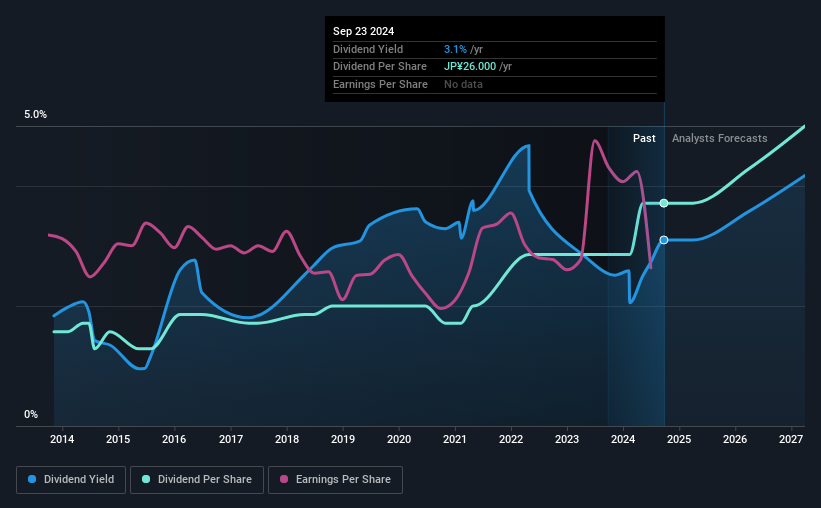Read This Before Considering The Hachijuni Bank, Ltd. (TSE:8359) For Its Upcoming JP¥13.00 Dividend

The Hachijuni Bank, Ltd. (TSE:8359) is about to trade ex-dividend in the next two days. The ex-dividend date occurs one day before the record date which is the day on which shareholders need to be on the company's books in order to receive a dividend. The ex-dividend date is important because any transaction on a stock needs to have been settled before the record date in order to be eligible for a dividend. Accordingly, Hachijuni Bank investors that purchase the stock on or after the 27th of September will not receive the dividend, which will be paid on the 9th of December.
The company's upcoming dividend is JP¥13.00 a share, following on from the last 12 months, when the company distributed a total of JP¥26.00 per share to shareholders. Looking at the last 12 months of distributions, Hachijuni Bank has a trailing yield of approximately 3.1% on its current stock price of JP¥838.50. Dividends are a major contributor to investment returns for long term holders, but only if the dividend continues to be paid. So we need to check whether the dividend payments are covered, and if earnings are growing.
View our latest analysis for Hachijuni Bank
Dividends are usually paid out of company profits, so if a company pays out more than it earned then its dividend is usually at greater risk of being cut. Hachijuni Bank is paying out an acceptable 51% of its profit, a common payout level among most companies.
When a company paid out less in dividends than it earned in profit, this generally suggests its dividend is affordable. The lower the % of its profit that it pays out, the greater the margin of safety for the dividend if the business enters a downturn.
Click here to see how much of its profit Hachijuni Bank paid out over the last 12 months.

Have Earnings And Dividends Been Growing?
Stocks with flat earnings can still be attractive dividend payers, but it is important to be more conservative with your approach and demand a greater margin for safety when it comes to dividend sustainability. Investors love dividends, so if earnings fall and the dividend is reduced, expect a stock to be sold off heavily at the same time. It's not encouraging to see that Hachijuni Bank's earnings are effectively flat over the past five years. It's better than seeing them drop, certainly, but over the long term, all of the best dividend stocks are able to meaningfully grow their earnings per share.
The main way most investors will assess a company's dividend prospects is by checking the historical rate of dividend growth. Hachijuni Bank has delivered 9.0% dividend growth per year on average over the past 10 years.
To Sum It Up
From a dividend perspective, should investors buy or avoid Hachijuni Bank? Hachijuni Bank has been struggling to generate growth while also paying out more than half of its earnings to shareholders as dividends. It doesn't appear an outstanding opportunity, but could be worth a closer look.
If you're not too concerned about Hachijuni Bank's ability to pay dividends, you should still be mindful of some of the other risks that this business faces. For example - Hachijuni Bank has 2 warning signs we think you should be aware of.
Generally, we wouldn't recommend just buying the first dividend stock you see. Here's a curated list of interesting stocks that are strong dividend payers.
Valuation is complex, but we're here to simplify it.
Discover if Hachijuni Bank might be undervalued or overvalued with our detailed analysis, featuring fair value estimates, potential risks, dividends, insider trades, and its financial condition.
Access Free AnalysisHave feedback on this article? Concerned about the content? Get in touch with us directly. Alternatively, email editorial-team (at) simplywallst.com.
This article by Simply Wall St is general in nature. We provide commentary based on historical data and analyst forecasts only using an unbiased methodology and our articles are not intended to be financial advice. It does not constitute a recommendation to buy or sell any stock, and does not take account of your objectives, or your financial situation. We aim to bring you long-term focused analysis driven by fundamental data. Note that our analysis may not factor in the latest price-sensitive company announcements or qualitative material. Simply Wall St has no position in any stocks mentioned.
About TSE:8359
Hachijuni Bank
Provides various banking products and services to individuals, corporations, and sole proprietors.
Adequate balance sheet second-rate dividend payer.


